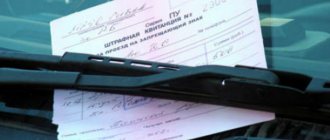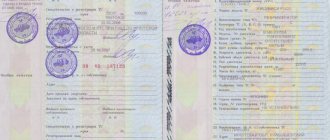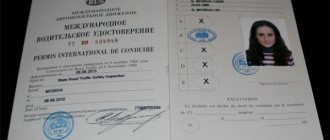Types of documents, the presence of which confirms a citizen’s property claims to a vehicle
The legislation of the Russian Federation establishes documents certifying a citizen’s ownership of a vehicle in his possession. First of all, correctly concluded agreements act in this capacity:
- purchase and sale;
- exchange;
- donation;
- rent;
- other transactions carried out within the framework of the Civil Code.
Ownership of the vehicle is also confirmed by a paper issued by the social security authority on the provision of a means of transportation to a disabled person. In cases where the owner's property claims arise as a result of legal proceedings, the legal document will be a court decision or court order.
Inheritance can also be the basis for acquiring ownership of a vehicle. In this case, a certificate confirming the citizen’s acceptance of the inheritance certifies the person’s property claims.
Also, documents confirming the title can be a certificate-invoice and a decision of a local government body recognizing the owner of a vehicle recognized as a find.
The above documents confirming the ownership of the car are title deeds. According to the law, direct ownership of the vehicle occurs at the time of its transfer under the contract, except for cases specifically stated in the contract or law. However, it should be noted that a transaction with a vehicle must undergo the registration procedure with government agencies and only then the citizen purchasing the car becomes its legal owner.
The transfer of ownership is confirmed by a certificate of registration. To complete this procedure, no driving experience is required, since the owner of the vehicle may be a person who does not have a driver’s license. To obtain a certificate and register a vehicle, you must provide one of the above documents to the territorial traffic police department.
Most often, property claims to transport are established on the basis of a purchase and sale agreement, since vehicles are purchased by citizens privately or at car dealerships. The fact of ownership can also be confirmed by an act of acceptance and transfer of the vehicle. It should contain the following information:
- Information about the buyer and seller (last name, first name, patronymic, registration address, place of registration of the legal entity);
- Vehicle data (model, make, identification number, color, etc.);
- All identified defects of the car (chips, scratches, incomplete equipment, etc.).
When an individual acts as a buyer, the seller can limit itself to only issuing a bill of lading. You should know that although an invoice can confirm the fact of transfer of ownership to a person, it is better to use the transfer and acceptance act as a document confirming title. Therefore, it is necessary to request the execution of the act from the seller.
We invite you to familiarize yourself with: Renting an apartment with the right to later purchase or leasing? 2021
The vehicle passport, certified by the State Traffic Safety Inspectorate, contains a note about the owner, but is not legal and does not confirm the transfer of ownership of the vehicle. According to the law, it is only a registration paper.
These, as it turned out, important questions were answered by the Supreme Court in its review of judicial practice. These are, in fact, specific recommendations for all other courts on how to make decisions in similar situations.
Some insurance companies, as well as some judges, as it turned out, do not know from what moment ownership of movable property, that is, a car, begins. As a result, the former refuse to pay after an accident, and the latter support them in their delusions.
So, in April 2014, an accident occurred in Rostov-on-Don. Zaitseva's driver crashed into Chekhov's car. Experts estimated the damage at 105 thousand rubles. However, the insurance company responsible for the accident refused to pay. She referred to the fact that the car allegedly did not belong to Chekhov. According to the vehicle passport, as well as the registration certificate, the car is registered with the traffic police for another person.
In general, insurers are more than willing to make excuses to avoid paying bills. However, the court of first instance confirmed the validity of their claims. The appellate court also supported him. Like, they didn’t deregister the car, they didn’t put it on a new one, under Chekhov. And therefore it does not belong to Chekhov, despite the fact that he paid money for it and received ownership of it in accordance with the purchase and sale agreement and the transfer and acceptance certificate.
However, the Supreme Court did not agree with this decision. In accordance with paragraph 2 of Article 218 of the Civil Code of the Russian Federation, ownership of property can be acquired by another person on the basis of a purchase and sale agreement, exchange, donation or other transaction for the alienation of this property. According to the general rule, enshrined in paragraph 1 of Article 223 of the Civil Code of the Russian Federation, the moment of emergence of the ownership right of the acquirer of a thing under an agreement is the moment of its transfer, unless otherwise provided by law or agreement.
Other is real estate. Ownership in this case is subject to state registration. And only after this procedure, having received the appropriate document, the owner becomes the full owner. But real estate includes land plots, subsoil plots and everything that is firmly connected to the land, that is, objects whose movement without disproportionate damage to their purpose is impossible, including buildings, structures, and unfinished construction projects.
We invite you to read: Is it possible to lease land from the state and how to do it?
By the way, immovable property also includes aircraft and sea vessels, as well as inland navigation vessels. They are also subject to state registration.
However, cars, motorcycles, etc. are classified as movable property. State registration of rights does not apply to them. Registration of vehicles is of an accounting nature and does not serve as a basis for the emergence of ownership rights to them. That is, without registration, a car cannot drive on public roads.
The Civil Code of the Russian Federation and other federal laws do not contain rules limiting the powers of the owner to dispose of a vehicle in cases where this vehicle has not been deregistered by him. There are no provisions in the legislation that state that a new purchaser of a vehicle under a contract does not have ownership rights to it if the previous owner has not deregistered it.
And who the car is registered in the traffic police should not bother anyone except the previous owner. The courts did not take all this into account. Therefore, the Supreme Court returned the case for a new trial to the appellate court so that the decision could be made with new inputs.
It must be said that the owner of the car is obliged to register the car with the traffic police within 10 days. Owning a car comes with certain responsibilities. At least for paying vehicle tax. It doesn’t matter whether it is used or not.
At the same time, the tax office, as well as the traffic police, consider the purchase and sale agreement and the acceptance certificate as documents that confirm the transfer of ownership. But for some reason the insurers don’t.
Data about the owner of the car is contained in documents such as PTS, STS, insurance policy, as well as a purchase and sale agreement (donation or exchange) and other documents.
Which of the following documents confirms ownership of the car, and which of them confirm the fact of ownership?
A document establishing ownership of a vehicle
A document confirming a citizen’s ownership of a vehicle must contain information about the transaction or decision of a government agency, the cost of the vehicle, data of an individual or legal entity, addresses and signatures of the parties involved in the transaction, the date and place of preparation, as well as all information about the car (year release, VIN code, color, make, model and others). The above documents confirming the ownership of the car are title deeds. According to the law, direct ownership of the vehicle occurs at the time of its transfer under the contract, except for cases specifically stated in the contract or law. However, it should be noted that a transaction with a vehicle must undergo the registration procedure with government agencies and only then the citizen purchasing the car becomes its legal owner. The transfer of ownership is confirmed by a certificate of registration.
When buying a car, an important point is to prepare all the necessary documents for the upcoming transaction, namely documentation that will confirm ownership of it. A small number of people have sufficient knowledge regarding this issue. Therefore, in this article this issue will be discussed in detail.
The very concept of “right of ownership/property” denotes private property. According to the current legislation of the Russian Federation, legal entities and individuals may have this right.
The right of ownership can extend to any type of property, including a car. The only exception is property that, by law, cannot be the property of legal entities or ordinary citizens.
Ownership is confirmed by relevant documents. According to them, the owner can freely use and dispose of his property. Property can change ownership and pass from one person to another. The same condition applies to the car. And here it can be difficult for an ordinary person to navigate all the current laws and the list of necessary documentation in order to properly register their vehicle. Therefore, experts recommend using the services of a lawyer in this matter in order to avoid common mistakes.
A document that can confirm the fact of ownership of a car takes the form of a certificate. It is issued by the competent authority that carries out state registration of vehicles.
A person takes possession of a car on the basis of the following documents:
- contract of sale;
- gift agreement;
- certificate-invoice;
- annuity agreement;
- a certificate that is competent to confirm a person’s accession to inheritance rights;
- court decision and so on.
All this documentation is legal. Many people believe that having a purchase and sale agreement is enough. But it's not that simple. According to the current law, ownership of property acquired under this agreement occurs at the immediate moment of its transfer (unless another option is specified by the clauses of the agreement or by law). Along with this, legislative standards do not regulate the occurrence of such a situation with movable property (this includes a car).
However, Article 223 of the Civil Code allows certain changes to be made to the document in the case of a car. That is, legal grounds may arise when signing an agreement between the buyer and seller. In this case, the car will be transferred into possession at the time of conclusion of the contract. If this is not stated, then the articles of the Civil Code come into force.
If a controversial situation arises when another owner of the car appears, the proceedings take place in accordance with Article 224. In accordance with it, the buyer must prove the fact that the vehicle was transferred to him from the seller.
It should be remembered that all transactions made with any type of property (this also includes a vehicle) must be registered with the relevant government agency. Only after this is the legal transfer of ownership rights from the seller to the buyer realized. The fact that the car has a new owner is confirmed by a certificate issued by a government agency. This procedure, as well as the registration of cars, is carried out at the traffic police department.
When purchasing any vehicle, you must remember that it is unacceptable to own it under a executed power of attorney.
The owner can transfer by proxy only permission to use the car. And in this case, a person acts only as an owner, but not as an owner.
It should be noted that the owner of a car can be one or several people at once. If there is one owner, questions regarding the ownership, disposal and use of the car do not arise. But quite often, several persons are the owners of a car (for example, when transferring a vehicle by inheritance, buying a car by spouses, etc.).
In this case, we will be talking about common property. Moreover, it does not matter to whom the car was ultimately registered. An exception may be the presence of a corresponding clause in the marriage contract. The rights of each owner, as well as the regulation of other issues that may arise in this situation, are spelled out in the relevant chapters of the country’s Civil Code.
Transfer of ownership of a car
The transfer of ownership of a car occurs at the moment of concluding a sales contract and the seller receives funds, the amount of which is specified in the contract. It is best to conclude an agreement with a notary - this method is the easiest and fastest. After this, the new owner of the car must deregister it himself and carry out all the necessary manipulations related to registration in his name.
Advice from Sravni.ru: when purchasing a car, you receive a package of ownership documents. If the purchase is made from a private person, conclude the purchase and sale transaction with a notary - this will protect you from fraud.
How is the authority to own, use and dispose of a vehicle confirmed?
Unlike property, the right of possession, use and disposal limits the powers of the trustee to alienate or perform legally significant actions with movable property. The agreement may provide for the right to represent the interests of the owner in the traffic police, endorse documents and control the car.
For this reason, purchase and sale transactions are often formalized with a notarized power of attorney , but in this case the car does not become full ownership.
There are 4 common forms of agreement confirming the right to own, use and dispose of a vehicle:
- Notarised power of attorney . An agreement in simple written form, certified by a notary, establishing the terms and conditions of temporary use.
- Agreement for free use . The car is transferred for free non-commercial use for a limited period with vehicle maintenance at the expense of the borrower.
- Lease agreement between individuals . The car is provided for temporary use and possession for a fee (Article 606 of the Civil Code of the Russian Federation).
- Financial lease (leasing) agreement . An agreement for the investment purchase of a vehicle, which is transferred for use to an authorized person for a certain fee with the possibility of subsequent redemption (Article 665 of the Civil Code of the Russian Federation).
According to the decision of the Supreme Court of the Russian Federation dated November 24, 2012, a notarized power of attorney is not required to be provided to traffic police officers and does not in all cases serve as confirmation of the legal right to use a car, since its authenticity cannot be established on the spot.
Documents confirming and certifying ownership
To understand this issue in detail, it is necessary to separate the concepts:
- document confirming ownership;
- document certifying ownership.
Documents issued by traffic police departments, customs, and insurance organizations refer to documents confirming ownership:
- PTS (vehicle passport) is a document containing information about the main technical characteristics of the car, information about the owner, registration and deregistration.
- STS (vehicle certificate) is a document confirming that a vehicle has been registered and registered.
- OSAGO (compulsory motor third party liability insurance policy) – insurance of property interests associated with the risk of civil liability of the vehicle owner for obligations arising from harm to the life, health or property of victims when using the vehicle.
We suggest you read: How long does it take for Rosreestr to register property rights?
All of the above documents contain information about the owner of the vehicle. And all these documents confirm the fact of ownership of the car, i.e. are documents confirming ownership. However, the emergence of ownership occurs even before the data is entered into the specified documents.
The procedure for registering a vehicle with the traffic police
The procedure for registering a car with the traffic police consists of the following steps:
- Submitting an application and documents.
- Inspection of the vehicle by a traffic police officer.
- Receiving documents and numbers.
Note. In 2021, when submitting documents through the government services portal, the driver has the right to first undergo an inspection of the vehicle, and only then submit the documents to the traffic police registration window. Those. Steps 1 and 2 can be swapped.
If you have prepared in advance all the documents necessary to change your registration data, then you have nothing to worry about.
Perhaps the only difficulty that may arise when registering a car is the large number of car enthusiasts doing the same thing. The queues at the traffic police can be quite impressive, but the procedure for changing registration data in any case takes one day.
I would like to note that some traffic police registration departments provide 24-hour registration. For example, MO STSI TNRER No. 4 of the Main Directorate of the Ministry of Internal Affairs of Russia for Moscow. So you can come to register your car at any time convenient for you.
After changing your registration data you will be given:
- car registration certificate;
- numbers (if necessary).
In addition, all your documents must be returned to you.
From what moment does it arise?
When does ownership arise and the car becomes owned? The moment of ownership of a car arises:
Its transfer from the seller to the buyer upon the transfer of the goods (Article 223 of the Civil Code of the Russian Federation).- After drawing up the relevant agreement (sale, donation or other procedure for the alienation of property) - Art. 218 of the Civil Code of the Russian Federation.
- If the purchase and sale agreement states that only after full payment for the car the buyer will become its owner, then he will first have to pay for the purchase and only after that can he consider himself the full owner.
The parties to the transaction, by agreement, choose the most convenient option for themselves.
Registration of a vehicle is not the basis for the emergence of ownership rights, since it can only arise on the basis of a purchase and sale agreement, gift, exchange or other transaction for the alienation of property (Article 218 of the Civil Code of the Russian Federation).











